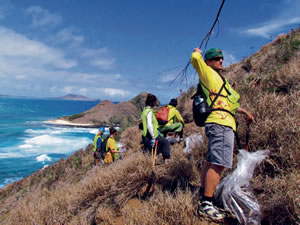Paddlers Help DLNR Clean Up Mokus For Shearwater Arrival

Devin Moody, manager at Kailua Sailboards & Kayaks, tosses a branch of haole koa (proper term: koa haole) during a recent cleanup of the shearwater nesting areas on Moku'iki, the smaller of the two Mokulua islands off Lanikai. The bag at his feet contains haole koa seed pods. Moody and his co-workers are on a mission to help the DLNR eradicate invasive plants before the birds return for mating season this month. Photo from Alissa Gunther.
In an effort to preserve the livelihood of wedge-tailed shearwater birds, Kailua Sailboards & Kayaks Inc. is donating its time and equipment to remove invasive plants that have been growing rapidly on the Mokulua islands.
With challenging ocean conditions and equipment problems, the state Department of Land and Natural Resources needed assistance removing these plants as the birds’ arrival to Hawaii for mating season generally occurs in late March. The kayak firm, meanwhile, has been organizing volunteers and providing kayaks to eradicate the haole koa pods and plants from Moku’iki, the smaller and much less accessible of the two islands off Lanikai beach.
“Landing at Moku’iki is unique in its hazards, requiring a well-timed landing between waves,” explained company owner Egmar Klemmer.”There’s a small window to get it right, but our staff made it look easy and we are confident in their abilities.”
With the majority of volunteers being highly trained kayak guides, approximately half of the haole koa has been removed in very delicate fashion. Volunteers have been instructed on how to avoid damaging the thousands of burrows where the birds return to nest and raise their offspring.
Even after completion of this project, the company is organizing additional service days with DLNR to maintain the bird sanctuary. To offer help, call KSK at 262-2555. Volunteers must be strong paddlers and – because of the steep grade of the island’s hillside – should be sure-footed and able to handle three to four hours of intense gardening.
DLNR lead biologists will conduct a brief training session for new workers, and the kayak firm will provide a safety kayaker to ensure a safe route, landing and launching to and from the island.





